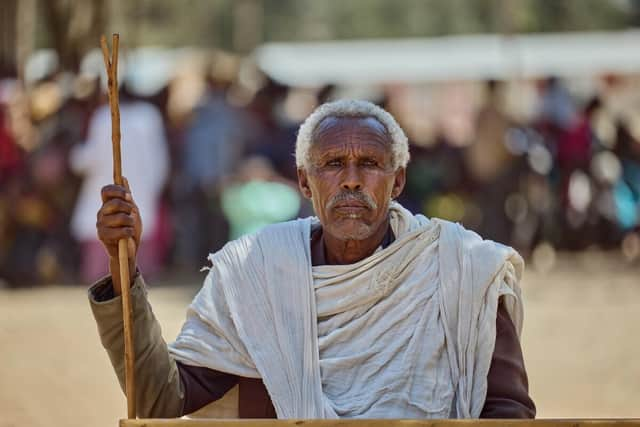Beyne Bsrat remembers well the feelings of desperation as his family struggled to find enough to eat during a famine in his home country of Ethiopia in the 1980s which forced him to relocate to neighbouring Sudan as a refugee.
Now, almost 40 years after harrowing images of starving children in his home country sparked the global Live Aid campaign to raise funds for Ethiopia through rock concerts and record sales, Mr Bsrat is calling for urgent help for his community, which has been left without regular food following two years of a civil war which decimated his local village in the northern Ethiopian region of Tigray - as well as a period of drought.
Experts have warned an official state of famine in the region could be declared as soon as July.

“In the famine in the 80s, I took my family to Sudan and we lived there for two years – at that time there was at least an option to cross the border and not be turned back but now everything is closed,” says Mr Bsrat, whose youngest child is just nine.
“The only option we have now is to wait for support, or die in our community, because we don’t have anything to eat in this community.”
More than 91 per cent of Tigray’s population has been “exposed to the risk of starvation and death”, the area’s Interim Regional Administration president, Getachew Reda, has warned – and millions are in desperate need of food aid.
A deadly civil war that displaced millions, destroyed essential infrastructure and health services, and is estimated to have claimed the lives of upwards of 600,000 people raged in Tigray from November 2020 for two years.
Meanwhile, interruptions to aid supplies in 2023, compounded by several failed rainy seasons in recent years resulting in severe drought, have left lives and livelihoods in ruins and accelerated the region’s humanitarian crisis.
Glasgow-based Mary’s Meals, which supplies food in schools in Ethiopia, reinstated its services after educational institutions began reopening. It is currently providing nutritious meals to more than 45,000 children in the region every school day, having doubled the size of its programme since Christmas.
It has recently launched a campaign to raise more funds in a bid to expand its services to more of the two million school-aged children in the region who are at risk of hunger.
Mr Bsrat, an elder in his community, recalls other food shortages in the region when he was young – and the effect hunger had on his education and daily life.
“When I was a child and I was hungry, I wouldn’t go to school,” he said. “I remember the feeling; I was thinking always about food. If a child is in hunger, they are constantly thinking about food. It is even difficult to attend class, they cannot think about school or anything else, just food.”
He adds: “Before the war, this community was hardworking and trying to fulfil the needs of every household, generally we were in a good situation.“But after the war, the troops had looted everything – they slaughtered our animals and ate them for themselves, they took away our agricultural materials and they even burned the school chairs as firewood. Many people have died of hunger here. You can see it in the eyes of our children."
Magnus MacFarlane-Barrow, director of Mary’s Meals, visited Tigray last month.
"I remember Live Aid well, and it was really shocking to be talking to people in Tigray of that age, who remember that famine experience,” he says.
"This one is set to be a whole lot worse and I think we all have that question about how come the world mobilised in that in that incredible way in the 1980s, yet this time, probably most people in the world aren't even aware that there's an issue happening in exactly the same place.
"It’s hard not to make the comparison and it’s quite disturbing.”
He says other issues taking place globally, such as the wars in Ukraine and Gaza, have taken international attention away from Ethiopia, where the famine in the 1980s killed up to one million people.
"Some of those issues that are grabbing the headlines in the world – and quite rightly and understandably - most of us can't do very much about, there are huge limitations in terms of what we can do,” he says. “But there's nothing to stop us responding to this situation and stopping children starving.
"I would definitely describe it as one of the most not the most alarming situations I have seen in terms of the levels of hunger that are already there. And the deeply concerning thing is everything points to that we're not at the worst of it.”
The number of teachers at Ara Primary School in Tigray has dwindled since the war as many left to fight – with some failing to return. Across the region, approximately 15,000 teachers are still unaccounted for and 95 per cent of classrooms in the central zone are damaged as a result of the war.
Around 300 pupils also did not return to school when the conflict eased and are now working as housemaids or looking after cattle in other areas, where they can get food as part of their job.
“Rather than dying of hunger, they chose to be a servant instead,” a teacher says.





